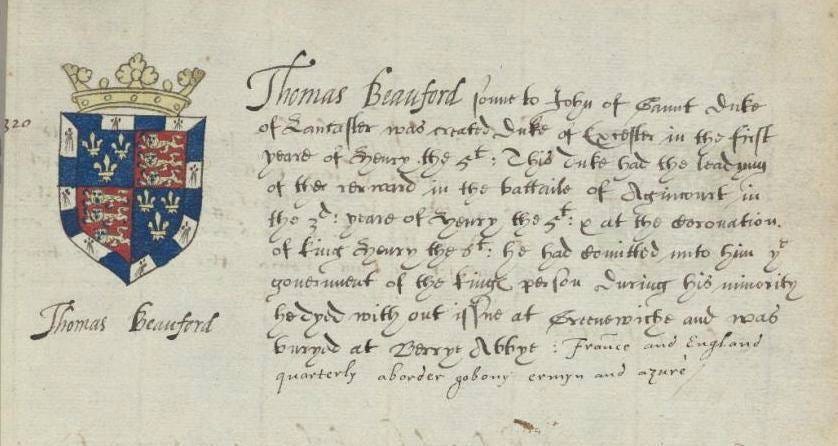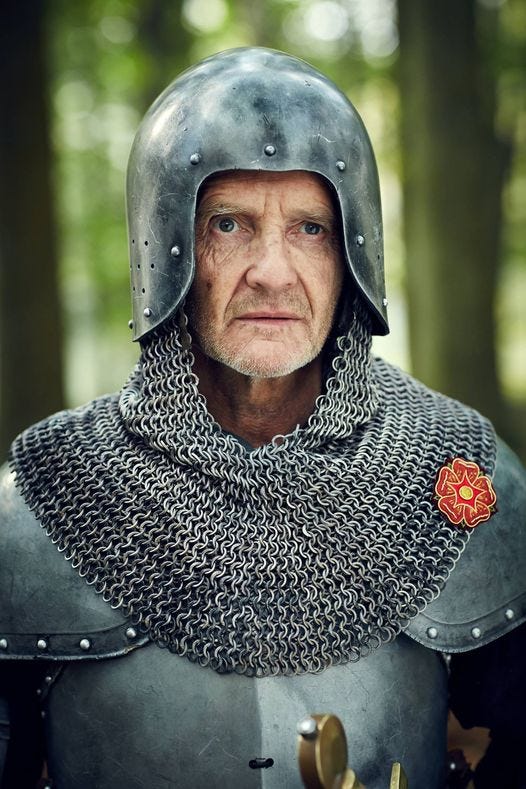People ask me who is my favourite medieval figure, and may be surprised to discover it’s not Henry VII, but rather his distant relation, THOMAS BEAUFORT. Why Thomas, you may ask? (at least, I hope you’re asking or you’re going to find the next part BORING).
The fifteenth century was one of the most tumultuous of periods in English history, starting with the usurpation of Henry IV in 1399, the back-end of the Hundred Years’ War which brought the highs of Henry V’s victories and the lows of England’s eventual capitulation across the Channel, and of course, culminating in the bitter dynastic conflict between the houses of York and Lancaster, the death of Richard III, disappearance of the Princes in the Tower, and the dawn of the Tudors.
During that period, plenty of figures rose to the fore, their names still etched on our public consciousness, thanks in large part to a certain William Shakespeare, who harvested the 15th century for some of his most inspired work. Henry’s IV, V, VI and VII, Richard of York and his troublesome sons Edward IV, George of Clarence, and Richard III, overmighty subjects like Cardinal Beaufort, Humphrey of Gloucester, Warwick the Kingmaker all feature heavily in the Bard’s works.
It is Thomas Beaufort, however, that I feel has long been overlooked, so allow me use this opportunity to introduce you to him.
Thomas was the youngest male of the first generation of Beauforts, the initially illegitimate children of John of Gaunt and Katherine Swynford. Whilst his elder brothers became an earl and a bishop respectively, the bar was set lower for Thomas who took up the sword to make his name. He was a younger son - he had to work to make his fortune.
Thomas excelled in this field, learning his craft during the Welsh revolt of the early 1400s, alongside his nephew Prince Henry, who was just eight years younger than him. In 1403, he was appointed Admiral of the Fleet, his remit extended in 1409 to cover all the ports cover all the ports of Ireland, Aquitaine and Picardy. In 1410, he even was briefly selected to fill the position of Chancellor, the first non-titled nobleman to fill the post in over 30 years and the first non-churchman in two decades. I mean, this was some guy.
In 1412, Thomas’s half-brother Henry IV declared war on France and he was selected as one of the leading commanders. Before disembarking, he was created Earl of Dorset. When his nephew became king the following year, rising to the throne as Henry V, Thomas further established his military reputation when he was personally tasked with holding the strategic gains of Harfleur and Rouen. It was Thomas who was able to provide the foundations for Henry V to push on towards immortality – during one tough moment when it seemed like Thomas would be forced to submit to a French army, it was reported by later historians he snapped ‘tell your master that Englishmen do not surrender!’ For ‘his service to the king and the realm on both sides of the seas’, Thomas was raised to the dukedom of Exeter, the only duke in England who was not one of the king’s brothers.
In 1420, Thomas was by his nephew’s side when Henry V married Katherine de Valois in Troyes Cathedral, securing a remarkable deal that the English king would become the next King of France. This had been the reason he had given years of sweat, blood and tears across the Channel. With Paris captured, it was Thomas who was appointed the city’s governor and given the delegate task of guarding the elderly and ill king of France, Charles VI.
Sadly for Thomas, his nephew’s dream of uniting the crowns of France and England was not realised, Henry V dying in August 1422 just outside Paris. Summoning the an he called ‘his very dear uncle’, to his side, he had one last mission for Thomas - to return home and become the guardian of the king’s 9-month-old heir, now Henry VI. The conscientious duke was moral, devout and courageous, every inch an upstanding product of the House of Lancaster and it was clearly anticipated he would serve as an ideal father-figure and mentor to the young king.
The historical record shows Thomas was brave in war, pious by nature, and loyal to his core. Above all, and the reason I feel he stands out over other knights of similar accomplishments, was the fact it is known he was generous to those less fortunate. The chronicler William Worcester wrote of Exeter:
‘every day he had 13 poor people and each of them was served with a first course and a second course of food with two loaves of bread, one of white and one of Chete-lof and each of them had three pence a day…He himself paid the cooks’ fee and ordered 26 gallons of pottage for the poor to eat, sometimes 300, 200 or 100 of them each day he fed, and everyday with wine’.
The duke went even further; on the eve of St Mary, each poor almswoman was given a set of bedclothes, a mattress, a pair of blankets and a pillow, whilst every woman lying in childbirth was provided with food and wine every day. On Maundy Thursday, Thomas always washed the feet of the poor, giving to each person a robe and as many pence as their years, sometimes even giving his cloak, doublet, belt and money purse. He did not abide swearers or liars in his company, and if anyone he had served with in France had fallen on hard times, he would provide food, fuel and candles. He sounds like he would have been a decent friend!
A scholar, soldier and statesman, regarded as ‘the wise and well-learned counsellor’ to three successive Lancastrian kings, Thomas Beaufort was unquestionably one of the last great knights of the Late Middle Ages. After his death at East Greenwich in 1426, his loss was not only keenly felt by the remaining Beauforts, but also by his fellow Englishmen. After a state funeral in St Paul’s Cathedral, he was buried in the abbey in Bury St Edmund’s, interred next to the wife that had predeceased him, Margaret Holland. They had no children, and Thomas’s memory was sadly forgotten by the generations that came after.
He was, however, as ‘Exeter’, played by Anton Lesser in the TV adaption of The Hollow Crown, based on the Shakespeare plays. That’s pretty damn cool.
The House of Beaufort: The Bastard Line that Captured the Crown
If you enjoyed that summary of the life of Tommy B, you will LOVE my book The House of Beaufort, released in 2017 and which really delves into his life in great detail. I’ve told you, he was the man. Pick up a copy now!
Upcoming Events
And if you are close enough to come along, here are the dates of my upcoming Autumn Book Tour. Come along - let’s have some history fun
Tickets available HERE








Thomas deserves a book just on his own.
I can't think of just one because I have a number. Here are six. 3 men. 3 women.
Joan Lady of Wales, wife of Llewellyn the Great, who came to my notice years ago on a visit to Anglesey. Yesterday I visited her sarcophagus. Although she was accused of adultery, her alleged lover, William de Braose no V hung, it was a political move by Llewellyn, I think and Joan was back in favour after a year. Illegitimate dtr of King John, she was also sister to Henry iii, the mother of at least 5 children, Joan was deeply mourned by Llewellyn. She was an able negotiator and acted as pacifier and political link between her husband and family but remained loyal to Llewellyn. A lady I admire very much.
Eleanor of Aquitaine. Queen twice over, powerful woman, political mover and shaker, a mother to three Kings, grandmother of Europe, regent for Henry ii, maligned by several male chroniclers, Crusader, rebel and a shrewd operator. Eleanor was the one to keep her husband and sons from killing each other probably. She had powers and status in her own right. She lived into her 80s. Marvellous woman.
Katharine of Aragon, intelligent, international Queen, educational promotor, warrior Queen, passionate, piuos, hard headed the same as Henry, patronising the arts and female artists. Had her children sadly not died, all but her dtr, Mary, Henry wouldn't have abandoned her. She taught him how to rule. She was extremely popular. She was just as passionate and fun loving as Anne Boleyn and the 2 women had the same style Book of Hours from the same printing. She was courageous and she was devoted to the end. She was married to Henry for 24 years and spent 3 years in exile but defiant before her death. People talk about Anne Boleyn as a scholar. Katharine was the real scholar.
Thank you for introducing me to a most interesting, inspiring, significant yet largely unknown figure. I can easily understand why you hold him in such high (and well-deserved) regard.